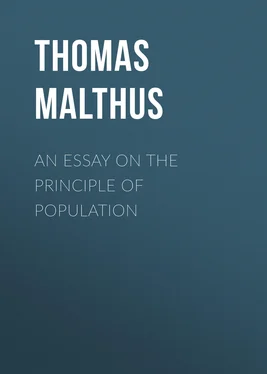Thomas Malthus - An Essay on the Principle of Population
Здесь есть возможность читать онлайн «Thomas Malthus - An Essay on the Principle of Population» — ознакомительный отрывок электронной книги совершенно бесплатно, а после прочтения отрывка купить полную версию. В некоторых случаях можно слушать аудио, скачать через торрент в формате fb2 и присутствует краткое содержание. Жанр: foreign_edu, sociology_book, на английском языке. Описание произведения, (предисловие) а так же отзывы посетителей доступны на портале библиотеки ЛибКат.
- Название:An Essay on the Principle of Population
- Автор:
- Жанр:
- Год:неизвестен
- ISBN:нет данных
- Рейтинг книги:3 / 5. Голосов: 1
-
Избранное:Добавить в избранное
- Отзывы:
-
Ваша оценка:
- 60
- 1
- 2
- 3
- 4
- 5
An Essay on the Principle of Population: краткое содержание, описание и аннотация
Предлагаем к чтению аннотацию, описание, краткое содержание или предисловие (зависит от того, что написал сам автор книги «An Essay on the Principle of Population»). Если вы не нашли необходимую информацию о книге — напишите в комментариях, мы постараемся отыскать её.
An Essay on the Principle of Population — читать онлайн ознакомительный отрывок
Ниже представлен текст книги, разбитый по страницам. Система сохранения места последней прочитанной страницы, позволяет с удобством читать онлайн бесплатно книгу «An Essay on the Principle of Population», без необходимости каждый раз заново искать на чём Вы остановились. Поставьте закладку, и сможете в любой момент перейти на страницу, на которой закончили чтение.
Интервал:
Закладка:
To remedy the frequent distresses of the common people, the poor laws of England have been instituted; but it is to be feared, that though they may have alleviated a little the intensity of individual misfortune, they have spread the general evil over a much larger surface. It is a subject often started in conversation and mentioned always as a matter of great surprise that, notwithstanding the immense sum that is annually collected for the poor in England, there is still so much distress among them. Some think that the money must be embezzled, others that the church-wardens and overseers consume the greater part of it in dinners. All agree that somehow or other it must be very ill-managed. In short the fact that nearly three millions are collected annually for the poor and yet that their distresses are not removed is the subject of continual astonishment. But a man who sees a little below the surface of things would be very much more astonished if the fact were otherwise than it is observed to be, or even if a collection universally of eighteen shillings in the pound, instead of four, were materially to alter it. I will state a case which I hope will elucidate my meaning.
Suppose that by a subscription of the rich the eighteen pence a day which men earn now was made up five shillings, it might be imagined, perhaps, that they would then be able to live comfortably and have a piece of meat every day for their dinners. But this would be a very false conclusion. The transfer of three shillings and sixpence a day to every labourer would not increase the quantity of meat in the country. There is not at present enough for all to have a decent share. What would then be the consequence? The competition among the buyers in the market of meat would rapidly raise the price from sixpence or sevenpence, to two or three shillings in the pound, and the commodity would not be divided among many more than it is at present. When an article is scarce, and cannot be distributed to all, he that can shew the most valid patent, that is, he that offers most money, becomes the possessor. If we can suppose the competition among the buyers of meat to continue long enough for a greater number of cattle to be reared annually, this could only be done at the expense of the corn, which would be a very disadvantagous exchange, for it is well known that the country could not then support the same population, and when subsistence is scarce in proportion to the number of people, it is of little consequence whether the lowest members of the society possess eighteen pence or five shillings. They must at all events be reduced to live upon the hardest fare and in the smallest quantity.
It will be said, perhaps, that the increased number of purchasers in every article would give a spur to productive industry and that the whole produce of the island would be increased. This might in some degree be the case. But the spur that these fancied riches would give to population would more than counterbalance it, and the increased produce would be to be divided among a more than proportionably increased number of people. All this time I am supposing that the same quantity of work would be done as before. But this would not really take place. The receipt of five shillings a day, instead of eighteen pence, would make every man fancy himself comparatively rich and able to indulge himself in many hours or days of leisure. This would give a strong and immediate check to productive industry, and, in a short time, not only the nation would be poorer, but the lower classes themselves would be much more distressed than when they received only eighteen pence a day.
A collection from the rich of eighteen shillings in the pound, even if distributed in the most judicious manner, would have a little the same effect as that resulting from the supposition I have just made, and no possible contributions or sacrifices of the rich, particularly in money, could for any time prevent the recurrence of distress among the lower members of society, whoever they were. Great changes might, indeed, be made. The rich might become poor, and some of the poor rich, but a part of the society must necessarily feel a difficulty of living, and this difficulty will naturally fall on the least fortunate members.
It may at first appear strange, but I believe it is true, that I cannot by means of money raise a poor man and enable him to live much better than he did before, without proportionably depressing others in the same class. If I retrench the quantity of food consumed in my house, and give him what I have cut off, I then benefit him, without depressing any but myself and family, who, perhaps, may be well able to bear it. If I turn up a piece of uncultivated land, and give him the produce, I then benefit both him and all the members of the society, because what he before consumed is thrown into the common stock, and probably some of the new produce with it. But if I only give him money, supposing the produce of the country to remain the same, I give him a title to a larger share of that produce than formerly, which share he cannot receive without diminishing the shares of others. It is evident that this effect, in individual instances, must be so small as to be totally imperceptible; but still it must exist, as many other effects do, which, like some of the insects that people the air, elude our grosser perceptions.
Supposing the quantity of food in any country to remain the same for many years together, it is evident that this food must be divided according to the value of each man's patent, or the sum of money that he can afford to spend on this commodity so universally in request. (Mr Godwin calls the wealth that a man receives from his ancestors a mouldy patent. It may, I think, very properly be termed a patent, but I hardly see the propriety of calling it a mouldy one, as it is an article in such constant use.) It is a demonstrative truth, therefore, that the patents of one set of men could not be increased in value without diminishing the value of the patents of some other set of men. If the rich were to subscribe and give five shillings a day to five hundred thousand men without retrenching their own tables, no doubt can exist, that as these men would naturally live more at their ease and consume a greater quantity of provisions, there would be less food remaining to divide among the rest, and consequently each man's patent would be diminished in value or the same number of pieces of silver would purchase a smaller quantity of subsistence.
An increase of population without a proportional increase of food will evidently have the same effect in lowering the value of each man's patent. The food must necessarily be distributed in smaller quantities, and consequently a day's labour will purchase a smaller quantity of provisions. An increase in the price of provisions would arise either from an increase of population faster than the means of subsistence, or from a different distribution of the money of the society. The food of a country that has been long occupied, if it be increasing, increases slowly and regularly and cannot be made to answer any sudden demands, but variations in the distribution of the money of a society are not infrequently occurring, and are undoubtedly among the causes that occasion the continual variations which we observe in the price of provisions.
The poor laws of England tend to depress the general condition of the poor in these two ways. Their first obvious tendency is to increase population without increasing the food for its support. A poor man may marry with little or no prospect of being able to support a family in independence. They may be said therefore in some measure to create the poor which they maintain, and as the provisions of the country must, in consequence of the increased population, be distributed to every man in smaller proportions, it is evident that the labour of those who are not supported by parish assistance will purchase a smaller quantity of provisions than before and consequently more of them must be driven to ask for support.
Читать дальшеИнтервал:
Закладка:
Похожие книги на «An Essay on the Principle of Population»
Представляем Вашему вниманию похожие книги на «An Essay on the Principle of Population» списком для выбора. Мы отобрали схожую по названию и смыслу литературу в надежде предоставить читателям больше вариантов отыскать новые, интересные, ещё непрочитанные произведения.
Обсуждение, отзывы о книге «An Essay on the Principle of Population» и просто собственные мнения читателей. Оставьте ваши комментарии, напишите, что Вы думаете о произведении, его смысле или главных героях. Укажите что конкретно понравилось, а что нет, и почему Вы так считаете.












